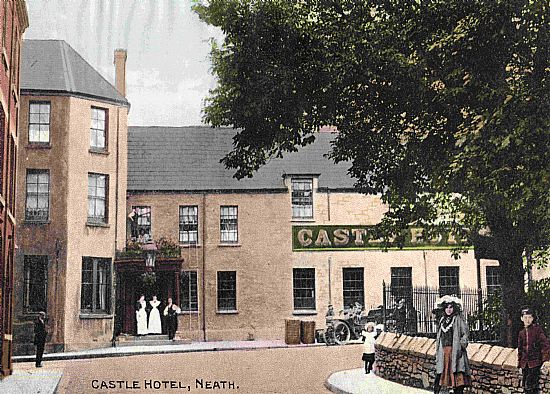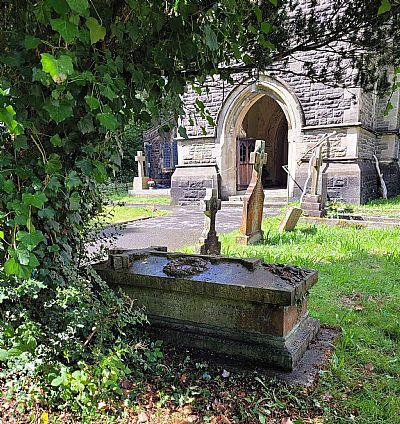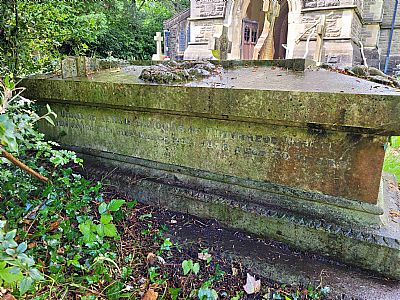PROFILE OF AN INNKEEPER
SUE WARE
Jenkin Savours was born in Taibach on 12th May 1807 son of Jenkin and Margaret Savours. His father, also Jenkin, is recorded as a glazier earlier in life but later became an innkeeper of the Globe Inn, Aberavon. Jenkin, the son, married and also became a publican, keeping the Somerset Arms in Taibach.
In 1842 Jenkin Savours took on the lease of The Castle Hotel, Neath and from here his close association with the town of Neath really begins. On 10th November 1843, one year after taking over The Castle Hotel, he hosts a ‘house warming dinner’ with tickets available at one guinea each. This event attracted seventy guests, many toasts were drunk and entertainments kept the dinner going until a late hour. Hywel Gwyn and Nash Vaughan Edwards Vaughan of Rheola House were present at this notable event.
Jenkin Savours wife, Jennet, died in 1851 and the census for that year shows him listed at The Castle Hotel, The Parade as Innkeeper and farmer of 100 acres employing two labourers. He is living with his sons Evan Morgan aged 14 and Richard Jenkin aged 12 and daughters Catherine aged 12 and Rosina aged 6. His sister, Ann, is also resident at The Castle Hotel during what must have been a difficult time for the family. The census also lists a barmaid, chambermaids, cook, boots, waiter and kitchen maid living on the premises.

The Castle Hotel was an established coaching inn situated on the Milford Road and the most prominent hotel in the town of Neath. The year 1850, however, was a turning point for the Hotel and the town when The South Wales Railway arrived in Neath to great rejoicing. This event caused the Castle Inn to lose a large area of land to the Railway. In 1854 the lease was transferred to Robert Atkinson but his tenure at the Castle Hotel was not a success. Could it be that Jenkin Savours was astute enough in his business dealings to make the best of the last years of the coaching trade before the railway became the major route west for travellers? Evidence of Jenkin Savours success can be seen in the will of his father, Jenkin, who died in 1854. His will states
‘considering that my eldest son Jenkin Savours has received a full and just share of my property during my lifetime and that his circumstances are prosperous and his business flourishing, I only bequeath to him the sum of one shilling.’
The name of Jenkin Savours crops up in newspaper reports on many occasions, ranging from his being charged, in 1848, of trespassing in pursuit of game in the Hamlet of Coedfrank and fined 30s to permitting drunkenness in the tap room in 1854. In 1868 his name crops up when he is charged with causing a nuisance contrary to by-laws and he is ordered to connect his premises to a main sewer within 10 days. The location of this offence is not noted.
As already mentioned, Jenkin Savours leaves The Castle Hotel in 1854 and the following year takes on the lease of Tyn yr Heol Farm, Blaenhonddan. It will be noted that in the census record for 1851 he calls himself innkeeper and farmer of 100 acres and it is very likely that the farm that he alludes to is in fact Tyn yr Heol Farm. In 1841 he was already leasing two fields alongside the River Clydach from Lord Dynevor. The previous tenant of Tyn yr Heol Farm from 1837, was Margaretta Targett, wife of Thomas Targett proprietor of the Castle Hotel, Neath. Thomas Targett dies in 1835 and his wife carries on running the hotel before marrying John Meredith in 1840. Following her death later that year, John Meredith carries on running the Hotel alone. As we already know, Jenkin Savours takes on the tenancy in 1842.
From 1855 Jenkin Savours becomes the gentleman farmer of Tyn yr Heol House, the farmhouse now elevated to House. He appears to already be a well-respected judge of livestock and dogs. His name crops up regularly in reports of the West Glamorgan Agricultural Association and is a regular prize winner in races and shows.
One place in Neath where the name of Savours could be seen was Savours Court in The Green area of town. It seems that some prominent names in Neath during the 1860s invested money in building closely packed houses including a series of courts featuring communal toilets and standpipes. Close to Savours Court we find Allens Court whose benefactor appears to be Nicholas Bowen Allen 1804-1871 a local builder. This was a poor part of town with a rough reputation.
In a Medical Officers Report of February 1895 Lukes Court, Jollys Court and Savours Court are described as ‘hovels without a pane of glass in the window frames and their partitions fallen down’ and that the spaces in front were sodden with sewage.
Opposite these courts in 1873 The Green Mission was built. Mission churches were established to cater for people in poor areas of town where they would be welcome regardless of their low status or ability to afford ‘Sunday Best’ clothing.
Savours Court was listed for demolition in 1938 but along with other areas of substandard housing in the locality demolition was delayed until after WW2 and indeed some of the properties were still inhabited in 1959.
Jenkin Savours died in 1878 and The Cambrian newspaper records his death under the heading ‘Awful Sudden Death’,
‘On Monday last Mr Jenkin Savours of Tyn yr Heol Farm, an old resident in the district was proceeding home from Neath on foot when near the Rhydding Collieries was observed to stagger and fall forward on his face. When picked up he was quite dead and a subsequent medical examination at the Travellers Rest (where his body had been conveyed) confirmed this. The deceased was about 65 years of age, well known and much respected in the neighbourhood. He was one of the best judges of stock in the neighbourhood and has on several occasions officiated as one of the stewards of the West Glamorgan Show.’
He is buried in St Matthews Church, Dyffryn in a tomb close to those of the Gwyn Family. He lost his mother at the age of 12 and at his death describes himself as a gentleman, having risen well above his lowly start in life.



